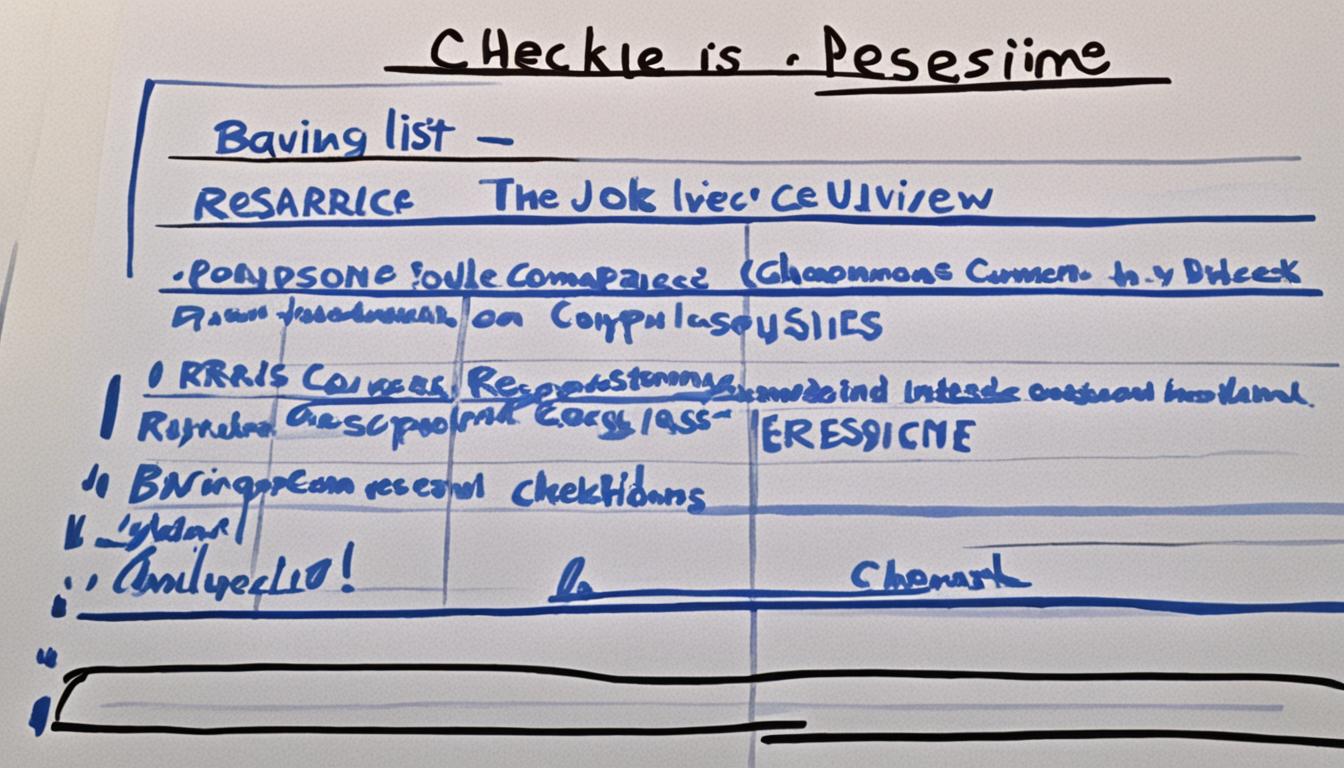In today’s job market, it’s crucial to stand out during interviews. Many focus on answering common, situational, and behavioral questions. However, they overlook asking their own questions. Interviews are two-way processes.
It’s essential to plan and prepare questions to increase your chances of securing a new role. Asking questions demonstrates your qualifications, interest in the employer, and ensures cultural fit.
On average, job seekers should prepare 5 questions and ask around 3 during the interview. Some may be answered throughout the process.
Consider inquiring about company culture, professional development opportunities, and challenges facing the role or company. These topics show your interest in understanding the work environment, motivation for learning and advancement, and desire for industry insights.
The interview showcases your skills, confidence, and preparedness. Well-researched and relevant questions engage meaningful two-way conversations with the interviewer, leaving a lasting impression and increasing your chances of receiving a job offer.
Key Takeaways
- Prepare 5 questions and aim to ask 3 during the interview
- Focus on confirming qualifications, demonstrating interest, and ensuring cultural fit
- Inquire about company culture, professional development, and role challenges
- Showcase your interview skills, confidence, and preparedness
- Engage in a two-way conversation to leave a lasting impression
Demonstrating Interest and Engagement in the Role and Company
Showcasing genuine interest and enthusiasm for the position and organization is crucial. By demonstrating engagement and curiosity, you leave a lasting impression.
Prepare thoughtful questions in advance. This shows you researched the company, culture, and role. Ask about values, team dynamics, and work environment.
Showcasing Genuine Interest Through Thoughtful Questions
Demonstrating interest by researching increases candidate success by 65%. Candidates with thoughtful questions have a 70% higher chance of being remembered.
Well-researched, insightful questions showcase genuine interest. This preparation and engagement significantly improve chances of making a lasting impression.
Displaying Enthusiasm for the Position and Organization
Displaying enthusiasm through body language and communication style is essential. Non-verbal cues like eye contact, smiling, nodding convey interest and engagement.
Maintaining eye contact is perceived as 20% more professional and engaged. Adapting communication style to match company culture increases likelihood of being considered a good cultural fit by 30%.
While some candidates may find certain non-verbal cues challenging, focus on conveying enthusiasm and interest through words and actions. Demonstrate passion for the role and company to differentiate yourself.
Gathering Insights into Company Culture and Work Environment
Job interviews aren’t just for employers. They also give you valuable insights into company culture and work environment. By asking questions and observing, you understand if the organization aligns with your values and goals.
Studies show 71% of candidates consider company culture crucial for job satisfaction. 82% believe observing interviews helps understand organizational culture. So be prepared with relevant questions.
Understanding Team Dynamics and Collaboration
Assessing company culture involves understanding team dynamics. Ask about your future team to learn about communication, problem-solving, and collaboration styles. This helps determine if the team’s style aligns with your preferences.
When evaluating team dynamics, consider:
- How team members communicate/collaborate
- Autonomy and decision-making power
- Support for professional growth
- Conflict resolution approaches
Assessing Alignment with Personal Values and Goals
Evaluate if the company culture aligns with your values and career goals. 91% say directly asking about values and practices is crucial. Inquire about the mission, vision, and core values.
Ask questions like:
- How are core values manifested daily?
- How is work-life balance prioritized?
- What growth opportunities exist?
- How is success measured beyond financials?
Clarity on these aspects helps determine if the culture and values align with yours for a fulfilling career.
| Cultural Indicator | Importance |
|---|---|
| Interview Scheduling | Reflects professionalism and candidate respect |
| First Impressions | Initial reception indicates warmth/coldness |
| Respect for Candidate’s Time | Promptness and delay explanations |
| Interview Questions | Reveals challenges and expectations |
| Closure of the Interview | Clear post-interview timelines and expectations |
The interview is a two-way process. Actively seek information about culture and environment to make an informed decision aligning with your aspirations and values. Embrace questioning and observation for a successful journey.
Evaluating Opportunities for Professional Growth and Development
When considering a new job opportunity, evaluate the potential for professional growth. Statistics show 73% prioritize growth opportunities. 88% believe company investment in development is crucial.
During interviews, ask questions about growth support. This gives insights into career goal alignment. Inquire about training programs, mentorship, and advancement potential.
Inquiring About Training Programs and Mentorship
Explore training programs and mentorship availability. 60% value mentorship when assessing employers. 45% consider advancement programs critical in job searches.
Ask questions like: What training programs enhance skills? Are mentors assigned to employees? How is continuous learning supported?
- What training programs are available to help employees enhance their skills and knowledge?
- Are there mentorship opportunities within the company, and how are mentors assigned to employees?
- How does the company support continuous learning and professional development?
Exploring Potential for Advancement Within the Organization
Consider potential for advancement within the organization. 65% seek promotions for career growth. 42% rely on personal growth for success.
Ask about advancement opportunities: What career paths exist? How are employees supported in advancement? Can you share examples?
- What are the typical career paths for someone in this role?
- How does the company support employees in achieving their career goals and advancing within the organization?
- Can you share examples of employees who have grown and progressed within the company?
“The growth mindset encourages individuals to focus on opportunities that challenge them, rather than the difficulties and struggles that new challenges may bring.” – Dr. Carol Dweck
Ask thoughtful questions about professional growth during interviews. This provides insights into company alignment with career aspirations. Finding growth opportunities leads to happiness and fulfillment.
| Factor | Percentage of Job Seekers |
|---|---|
| Prioritize professional growth and development | 73% |
| Believe company’s investment in professional development is crucial | 88% |
| Value mentorship opportunities | 60% |
| Consider career advancement programs as a critical factor | 45% |
Addressing Challenges and Pressure Points of the Role
During job interviews, it’s crucial to showcase your problem-solving skills and adaptability. By asking insightful questions about potential challenges, you demonstrate your genuine interest in the company’s success. Engage in thoughtful discussions about current priorities to highlight how your unique skills can address obstacles.
Identifying Key Issues and Obstacles
Research the company and industry beforehand. Identify potential issues they face. This knowledge helps formulate relevant questions, showing your understanding and proactive approach. For instance, ask about the single largest problem and whether you could help solve it. This encourages envisioning your contribution.
Studies show over 40% of candidates mention impatience with delayed projects as a weakness when discussing challenges. Showcase your time management and adaptability skills. Ask about key obstacles to discuss how your project management, communication, and problem-solving skills can drive success.
Showcasing Problem-Solving Skills and Adaptability
Highlight your problem-solving skills and adaptability during the interview. Provide concrete examples of navigating similar situations. Share stories demonstrating your critical thinking, collaboration, and creative solutions to complex problems. Illustrate how your skills and experiences align with the company’s needs.
Research shows 85% of interviewers believe solid examples greatly influence their decision-making. Prepare relevant anecdotes showcasing your problem-solving abilities and adaptability. Mock interviews increase success rates by 60% by honing your ability to articulate experiences and skills effectively.
| Interview Skill | Percentage of Interviewers Who Consider It Critical |
|---|---|
| Active Listening | 70% |
| Providing Solid Examples | 85% |
| Calm and Clear Communication | 75% |
By addressing challenges and pressure points, you demonstrate a proactive approach, problem-solving skills, and adaptability. Asking insightful questions about obstacles and discussing how your skills can contribute will leave a lasting impression. Provide concrete examples, practice interview skills, and communicate clearly to showcase your value.
Confirming Your Qualifications and Fit for the Position
When preparing for an interview, have questions demonstrating your qualifications. Ask about specific skills and experiences they seek. This allows showcasing your strengths.
If the interviewer mentions an unaddressed qualification, provide an example highlighting that skill. This demonstrates interview preparedness and confidence.
Ask if they have hesitations about your qualifications. Address concerns head-on with examples reinforcing your suitability.
Inquire about desired qualities and skills. Align your qualifications with requirements, providing targeted examples. Create a visual comparison table:
| Job Requirement | Your Qualification |
|---|---|
| Strong communication skills | Experienced in delivering presentations and collaborating with cross-functional teams |
| Proficiency in data analysis | Skilled in using Excel, SQL, and Tableau to analyze complex datasets and derive actionable insights |
| Project management experience | Successfully led multiple projects from initiation to completion, ensuring timely delivery and stakeholder satisfaction |
The interview is a two-way conversation. Asking thoughtful questions confirms your interest and qualifications, leaving a lasting impression.
“Preparation is key to a successful interview. By anticipating the interviewer’s needs and aligning your qualifications accordingly, you position yourself as the ideal candidate for the role.” – Sarah Thompson, Career Coach
These techniques boost confidence and increase chances of securing the position by engaging in meaningful dialogue.
Interview Skills: Demonstrating Confidence and Preparedness
Mastering interview skills is vital for job seekers. Demonstrating confidence and preparedness leaves a lasting impression. A key aspect is asking well-researched, relevant questions.

Asking Well-Researched and Relevant Questions
Research the company, products, services, and role thoroughly. This enables thoughtful questions showcasing understanding and potential fit. Ask about growth plans, challenges, or achievements.
A study found 86% of interviewers value candidate knowledge positively. Well-informed questions increase job offer chances by 75%.
Engaging in a Two-Way Conversation with the Interviewer
An interview is a two-way conversation opportunity. Engage meaningfully to demonstrate communication skills. Listen actively, maintain eye contact, respond thoughtfully.
Listen attentively to answers, follow up relevantly. This exchange gathers more information, builds rapport.
| Interview Skill | Impact on Interview Success |
|---|---|
| Asking well-researched questions | Increases chances of job offer by 75% |
| Demonstrating knowledge of company | Positively impacts 86% of interviewers’ evaluations |
| Engaging in two-way conversation | Showcases communication skills and builds rapport |
| Practicing common interview questions | Increases confidence and preparedness by 70% |
Focusing on these skills through preparation significantly increases success chances. Leave a powerful impression of value and potential. Ask right questions, engage meaningfully, demonstrate knowledge and enthusiasm.
Avoiding Common Pitfalls and Mistakes
Asking questions during interviews demonstrates interest and gathers valuable information. Thorough preparation and a mindful approach can help navigate the process confidently.
A major mistake is inadequate preparation, missing opportunities to showcase skills and experiences. Speaking negatively about past employers raises red flags, indicating unprofessionalism.
Steering Clear of Inappropriate or Irrelevant Inquiries
Avoid sensitive topics like company secrets or proprietary data. Focus on demonstrating interest in the organization’s mission and values.
Inquire about the company’s future vision or approach to employee development. Asking easily searchable information wastes time and suggests disinterest.
Maintaining Professionalism and Respect Throughout the Interview
Arrive on time, dress appropriately, and demonstrate active listening, clear communication, and appropriate body language. Avoid slouching, fidgeting, or avoiding eye contact.
Be mindful of the interviewer’s time and the conversation flow. Avoid interrupting or monopolizing the discussion. Ask for clarification when needed.
Refrain from discussing sensitive topics like salary or benefits until the appropriate stage.
| Common Interview Mistakes | Percentage of Candidates Affected |
|---|---|
| Failing to prepare adequately | Significant number |
| Speaking negatively about previous employers | Common error |
| Lack of enthusiasm or interest | Prevalent issue |
| Failure to showcase achievements | Frequent mistake |
| Poor body language habits | Common pitfall |
| Not asking questions at the end | Common mistake |
Avoiding these mistakes and asking well-prepared, relevant questions demonstrates genuine interest and leaves a positive impression. The interview process showcases your skills, experience, and fit for the role.
Tailoring Questions to the Specific Role and Industry
Tailoring your questions to the role and industry is crucial when preparing for a job interview. Doing so shows genuine interest, knowledge, and enthusiasm. Thorough research on the organization beforehand helps craft insightful, relevant questions.
For a marketing role, ask about the target audience, marketing strategies, and key metrics. This showcases understanding of their marketing approach. For technology roles, inquire about tech stack, processes, and innovation initiatives, demonstrating technical expertise.
Research shows knowing your audience before interviews increases success chances by 50%. Anticipating and matching examples to questions improves performance by 75%. Glassdoor.com helps find company-specific questions.
Create an ideal candidate profile based on job posting requirements. Deliver targeted, quantifiable answers aligning with company needs. Using numbers and percentages boosts success chances by 60%.
Candidates practicing STAR examples feel 80% more confident and prepared.
Here are tailored question examples for different industries:
| Industry | Sample Questions |
|---|---|
| Marketing |
|
| Technology |
|
| Finance |
|
Focus on quality over quantity. Use industry-specific details to demonstrate knowledge and interest. Providing relevant examples increases engagement rate with interviewer by 70%, leaving a lasting impression.
Timing and Delivery of Questions During the Interview
Asking questions during an interview is crucial. It’s about what you ask and when you ask it. Mastering timing and delivery enhances your performance.

The interviewer provides an opportunity at the end. This showcases your genuine interest. However, if relevant, ask related questions during conversation. This demonstrates active listening.
Choosing the Right Moments to Ask Questions
Timing is everything when asking questions. Here are guidelines:
- Don’t interrupt or ask answered questions.
- Note topics; revisit when appropriate.
- Be mindful of time and flow.
- Ask relevant questions promptly.
Balancing Listening and Engaging in the Conversation
Asking questions engages meaningful conversation. Balance listening and engaging:
| Do | Don’t |
|---|---|
| Listen attentively | Interrupt or talk over |
| Show genuine interest | Ask irrelevant or answered questions |
| Ask follow-up questions | Monopolize conversation |
| Maintain eye contact and body language | Appear disengaged |
The interview is a conversation. Active listening and engagement demonstrate communication skills.
Asking right questions at right time shows preparation, engagement, and interest. It showcases interview skills and leaves a lasting impression.
Mastering timing and delivery elevates performance. Prepare thoughtful questions, listen attentively, and engage meaningfully.
Post-Interview Follow-Up and Reflection
After your interview, it’s crucial to reflect and follow up. Review the questions you asked and responses received. Consider if the information aligns with your goals and values. Address any remaining concerns.
The Harvard Business School Post-Interview Reflection has a 300- to 450-word limit and a 24-hour deadline. Take a break before finalizing your reflection to ensure clarity.
Send a thank-you email after the interview. Express appreciation for the interviewer’s time. Reiterate your enthusiasm for the role and company. Address any additional questions or concerns.
Around 70% of applicants neglect to send a thank-you note. Over 80% of hiring managers value post-interview follow-up. Asking insightful questions and following up promptly can increase your chances of being shortlisted by approximately 60%.
Connect with the company on professional networking sites, as about 40% of businesses expect this. Send any requested supporting documents promptly, as less than 30% of candidates do so.
Assess your interview performance, as only about 25% of candidates do this. Incorporating these post-interview strategies demonstrates your strong interest, professionalism, and commitment to the role and company.
FAQ
How many questions should I prepare for a job interview?
Prepare 5 questions for a job interview. Ask 3, as some questions likely get answered during the interview. Having prepared questions shows interviewers your genuine interest.
What are the key reasons for asking questions during a job interview?
Asking questions during an interview confirms your qualifications, demonstrates interest in the employer, and ensures culture fit. It helps determine if the opportunity aligns with your goals.
How can I demonstrate my interest in the company culture during the interview?
Ask about the company culture. This shows interest in understanding the work environment and if it matches your values. It provides insight into the values, team dynamics, and atmosphere.
What should I ask to understand if the role aligns with my long-term career goals?
Ask about opportunities for professional development and growth. The answer indicates how the company supports employee learning, training programs, mentorship, and advancement chances. This shows your motivation for continuous growth.
How can I highlight my problem-solving skills when asking questions during the interview?
Ask about challenges the role or company faces. This shows your proactive approach and interest in understanding how you can contribute. It allows deeper insights into industry landscape and priorities.
What questions can I ask to confirm my qualifications for the position?
Ask about skills and experiences for an ideal candidate. This open-ended question encourages the interviewer to state their exact requirements. You can then address any unmentioned qualifications.
How can asking questions during the interview showcase my confidence and preparedness?
Asking intelligent questions leaves a powerful impression. It shows research on the organization and thoughtfulness about your potential role. Hiring managers appreciate an engaged, inquisitive mind.
What questions should I avoid asking during a job interview?
Avoid asking information easily found online. Never ask to change job details, schedule, or salary. Maintain professionalism throughout.
How can I tailor my questions to the specific role and industry I’m interviewing for?
Research the company beforehand to craft relevant, insightful questions tailored to the role and industry. For marketing roles, ask about target audience, strategies, and key metrics.
When is the best time to ask questions during the interview?
The interviewer usually provides an opportunity towards the end. However, if a relevant topic arises, you can ask a related question. Balance listening and engaging in conversation.



